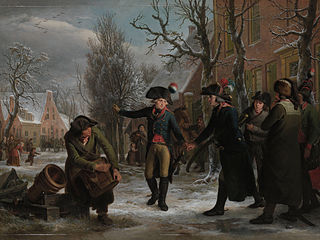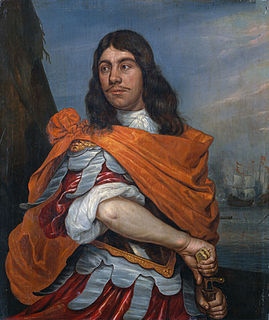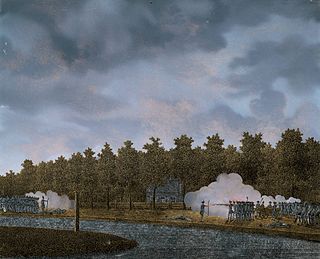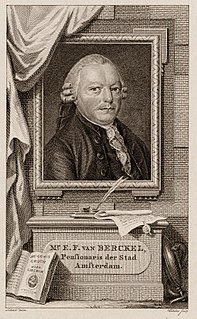
The Patriottentijd was a period of political instability in the Dutch Republic between approximately 1780 and 1787. Its name derives from the Patriots (Patriotten) faction who opposed the rule of the stadtholder, William V, Prince of Orange, and his supporters who were known as Orangists (Orangisten)

Gijsbert Karel, Count van Hogendorp was a liberal conservative and liberal Dutch statesman. He was the brother of Dirk van Hogendorp the elder and the father of Dirk van Hogendorp the younger.

Rutger Jan Schimmelpenninck, Lord of Nyenhuis, Peckedam and Gellicum, was a Dutch jurist, ambassador and politician who served as Grand Pensionary of the Batavian Republic from 1805 to 1806.

The Batavian Revolution was a time of political, social and cultural turmoil at the end of the 18th century that marked the end of the Dutch Republic and saw the proclamation of the Batavian Republic. The period of Dutch history that followed the revolution is referred to as the "Batavian-French era" (1795–1813) even though the time spanned was only 20 years, of which three were under French occupation.

Henry Hope (1735–1811) was an Amsterdam merchant banker born in Boston, in Britain's Massachusetts Bay Colony in North America.

An exercitiegenootschap or militia was a military organisation in the 18th century Netherlands, in the form of an armed private organization with a democratically chosen administration, aiming to train the citizens and the lower bourgeoisie in use of muskets. Exercitiegenootschappen were propagated by Joan van der Capellen tot den Pol, who translated an old book (1732) by Andrew Fletcher on arming a nation's citizens and so got the idea from Scotland. He also saw them as necessary due to the serious decline in the existing, Orangist schutterijen.

In the history of the Dutch Republic, Orangism or prinsgezindheid was a political force opposing the Staatsgezinde (pro-Republic) party. Orangists supported the princes of Orange as Stadtholders and military commanders of the Republic, as a check on the power of the regenten. The Orangist party drew its adherents largely from traditionalists – mostly farmers, soldiers, noblemen and orthodox Catholic and Protestant preachers, though its support fluctuated heavily over the course of the Republic's history and there were never clear-cut socioeconomic divisions.

Gerard Brantsen was a Dutch politician and diplomat. He was one of the Dutch signatories to the treaty ending the Fourth Anglo-Dutch War in 1784. He was also mayor of Arnhem in 1762 and 1765, and several times an alderman of this city. He was a member of the Staatsbewind of the Batavian Republic between 16 October 1801 and 29 April 1805.

Adriaan van der Willigen was a Dutch writer of plays and travelogues who is mostly remembered today for his comprehensive list of painter biographies.

Catharina Mulder, also known as Kaat Mossel , was a Dutch orangist. She was a fishmonger, selling mussels in Rotterdam, hence her nickname: Kaat Mossel = Cate Mussel. She led and organised the orangist riots in Rotterdam in 1784 against the patriots. She is regarded as a representative of the common orangism.

Cornelis "Kees" de Gijselaar was a Dutch politician and patriot, and a leader in the rebellion during the Dutch Republic against the House of Orange.
Cornelia is a feminine given name. It is a feminine form of the name Cornelius or Cornelis. Nel, Nelly, Corey, Lia or Nelia can be used as a shortened version of Cornelia. Conny, Connie, Nele or Neele are popular German short forms used in their own right. Lia is a short version of the Dutch name.

The Prussian invasion of Holland was a Prussian military campaign in September–October 1787 to restore the Orange stadtholderate in the Dutch Republic against the rise of the democratic Patriot movement.

The Battle of Jutphaas, also known as the Battle of the Vaart or the Battle of Vreeswijk, occurred on 9 May 1787 on the banks of the Vaartsche Rijn canal near Jutphaas and Vreeswijk between Orangists and Patriots.

Het Bijltjesoproer or Kattenburgoproer of 30 May 1787 was an uprising of Dutch Orangist ship carpenters in the Kattenburg quarter of Amsterdam against the city's Patriot regenten. These labourers were nicknamed "Bijltjes" ; hence the name Bijltjesoproer.

Engelbert François van Berckel was a Dutch politician during the Patriottentijd.

Hendrik Daniëlszoon Hooft, Ambachtsheer of Urk and Emmeloord was a Dutch politician during the Patriottentijd.

Willem Gerrit Dedel SalomonszoonAmbachtsheer of Sloten and Sloterdijk was a Dutch politician during the Patriottentijd in the Dutch Republic.

Jean Antoine d'Averhoult, baptized as Jan Anthony d'Averhoult was a Dutch military officer and politician of French Huguenot extraction, who played a leading role in both the Patriottentijd and the French Revolution.

Willem Bastiaensz Schepers was a Dutch admiral. Having made his career as a shipping magnate in Rotterdam, Schepers was rewarded in 1673 for his political support to the new Orangist regime, by being made lieutenant admiral. In 1688, he organised the transport fleet for the Glorious Revolution.


















